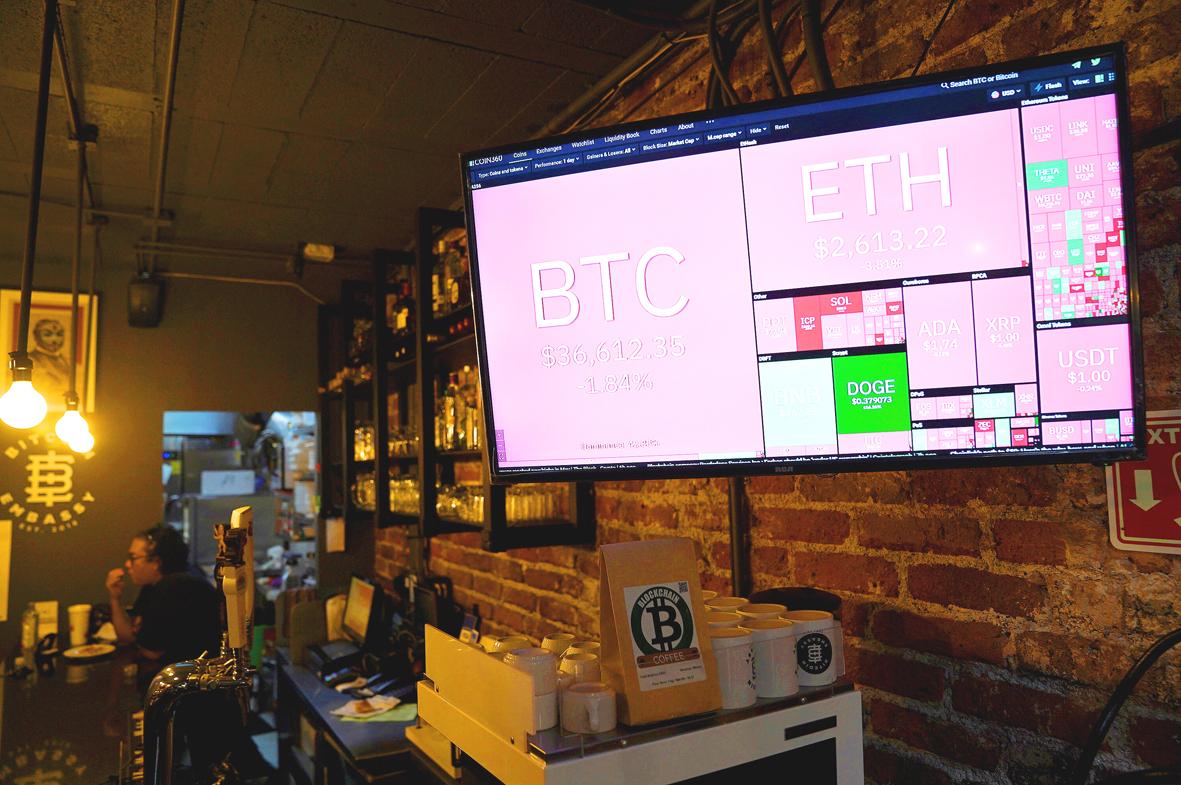Financial payments start-up Square Inc was on Friday at work on a real-world wallet for safely pocketing cryptocurrency.
Square founder and CEO Jack Dorsey, who is also the top executive at Twitter Inc, last month on Twitter asked for feedback on the notion.
“This community’s response to our thread about this project has been awesome — encouraging, generous, collaborative and inspiring,” Jesse Dorogusker, a member of Square’s hardware team, wrote on Twitter on Thursday.

Photo: Reuters
“We have decided to build a hardware wallet and service to make bitcoin custody more mainstream,” he said.
Dorsey endorsed Dorogusker’s post, tweeting: “We’re doing it #bitcoin.”
Hardware wallets can be used to store digital currency offline, synchronizing with applications for transactions on the Internet as needed.
Another option for cryptocurrency owners is to use “virtual” wallets, essentially trusting third parties to keep money safe and using passwords to access funds.
Dorsey on Twitter said that bitcoin is a currency for the masses, and that it is important to have ways for people to hold it that do not involve entrusting it to outside parties.
“The exchange you used to buy your bitcoin probably attends to your security with good intent, but circumstances may reveal ‘custody’ actually means ‘IOU,’” Dorsey wrote on Twitter last month, referring to a shorthand for “I owe you.”
“Deciding to take custody, and security, of your bitcoin is complicated,” he added.
Dorsey envisioned a bitcoin wallet that makes it easy for people to use some of it for shopping, for example through smartphones, while protecting the rest of the cryptocurrency.
“We can imagine apps that work without Square and maybe also without permission from Apple and Google,” he said, referring to the makers of the world’s two most widely used smartphone operating systems.
Square would set up accounts on Twitter and software developer community Web site GitHub dedicated to the bitcoin wallet project, Dorsey said.
In related news, a 101.38 carat diamond was sold at Sotheby’s for HK$95.1 million (US$12.3 million) in cryptocurrency, becoming the most expensive piece of jewelry sold through such type of payment, the auction house said.
The pear-shaped diamond, named “The Key 10138,” was on Friday sold to an unidentified private collector, Sotheby’s said in a statement.
The gem from Diacore Co was the second-largest pear-shaped diamond ever to be sold publicly, it said.
Prior to the sale, the international auction house said it would take bitcoin or ether as payment for the diamond, which fetched less than the estimate of as much as US$15 million in the single-lot offering in Hong Kong.
The auction was livestreamed and attracted no more than a dozen bids.
Earlier last week, Sotheby’s said it was the most expensive physical object ever publicly offered for purchase with cryptocurrency.
Auction houses are increasingly accepting cryptocurrencies for payment, with Phillips last month offering a piece from street artist Banksy for ether or bitcoin.
Christie’s in March accepted payment in ether for the record US$69.3 million sale of Beeple’s Everydays: the First 5,000 Days.
Additional reporting by Bloomberg

MULTIFACETED: A task force has analyzed possible scenarios and created responses to assist domestic industries in dealing with US tariffs, the economics minister said The Executive Yuan is tomorrow to announce countermeasures to US President Donald Trump’s planned reciprocal tariffs, although the details of the plan would not be made public until Monday next week, Minister of Economic Affairs J.W. Kuo (郭智輝) said yesterday. The Cabinet established an economic and trade task force in November last year to deal with US trade and tariff related issues, Kuo told reporters outside the legislature in Taipei. The task force has been analyzing and evaluating all kinds of scenarios to identify suitable responses and determine how best to assist domestic industries in managing the effects of Trump’s tariffs, he

TIGHT-LIPPED: UMC said it had no merger plans at the moment, after Nikkei Asia reported that the firm and GlobalFoundries were considering restarting merger talks United Microelectronics Corp (UMC, 聯電), the world’s No. 4 contract chipmaker, yesterday launched a new US$5 billion 12-inch chip factory in Singapore as part of its latest effort to diversify its manufacturing footprint amid growing geopolitical risks. The new factory, adjacent to UMC’s existing Singapore fab in the Pasir Res Wafer Fab Park, is scheduled to enter volume production next year, utilizing mature 22-nanometer and 28-nanometer process technologies, UMC said in a statement. The company plans to invest US$5 billion during the first phase of the new fab, which would have an installed capacity of 30,000 12-inch wafers per month, it said. The

Taiwan’s official purchasing managers’ index (PMI) last month rose 0.2 percentage points to 54.2, in a second consecutive month of expansion, thanks to front-loading demand intended to avoid potential US tariff hikes, the Chung-Hua Institution for Economic Research (CIER, 中華經濟研究院) said yesterday. While short-term demand appeared robust, uncertainties rose due to US President Donald Trump’s unpredictable trade policy, CIER president Lien Hsien-ming (連賢明) told a news conference in Taipei. Taiwan’s economy this year would be characterized by high-level fluctuations and the volatility would be wilder than most expect, Lien said Demand for electronics, particularly semiconductors, continues to benefit from US technology giants’ effort

‘SWASTICAR’: Tesla CEO Elon Musk’s close association with Donald Trump has prompted opponents to brand him a ‘Nazi’ and resulted in a dramatic drop in sales Demonstrators descended on Tesla Inc dealerships across the US, and in Europe and Canada on Saturday to protest company chief Elon Musk, who has amassed extraordinary power as a top adviser to US President Donald Trump. Waving signs with messages such as “Musk is stealing our money” and “Reclaim our country,” the protests largely took place peacefully following fiery episodes of vandalism on Tesla vehicles, dealerships and other facilities in recent weeks that US officials have denounced as terrorism. Hundreds rallied on Saturday outside the Tesla dealership in Manhattan. Some blasted Musk, the world’s richest man, while others demanded the shuttering of his